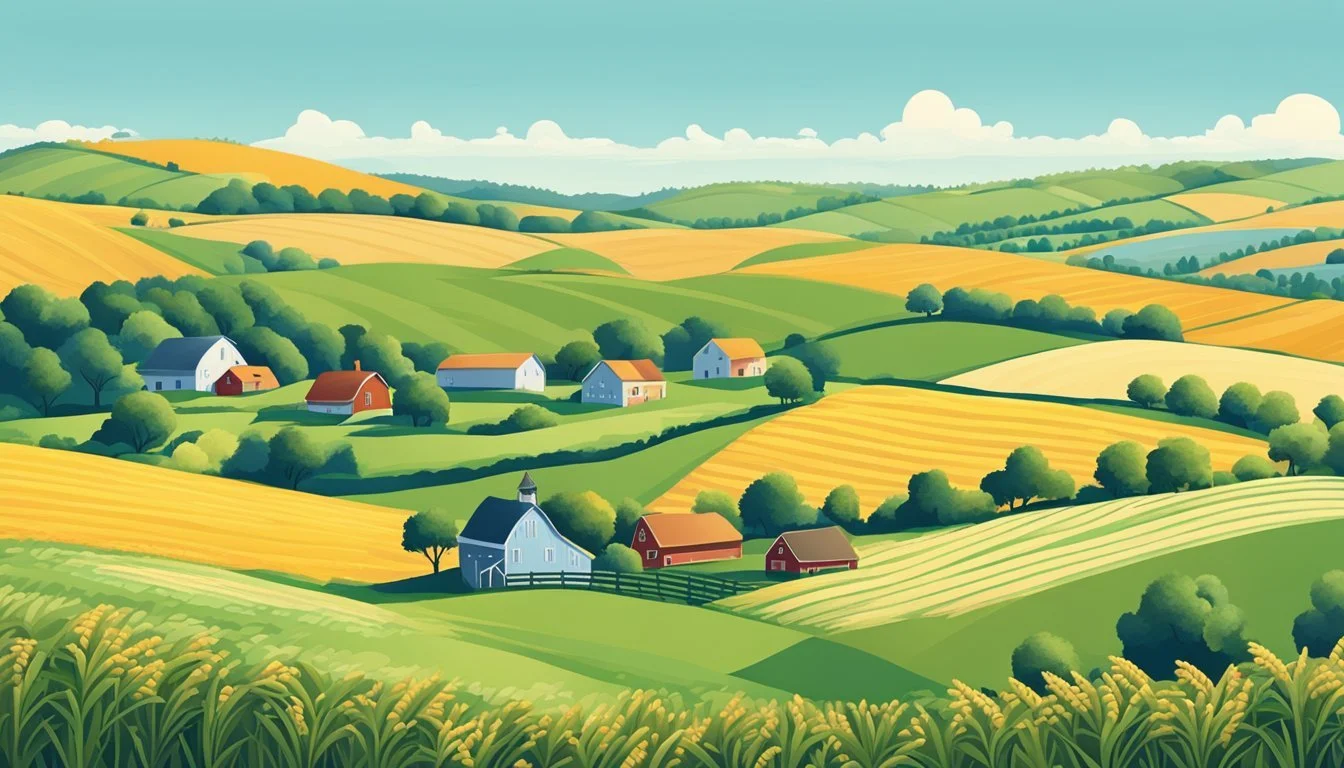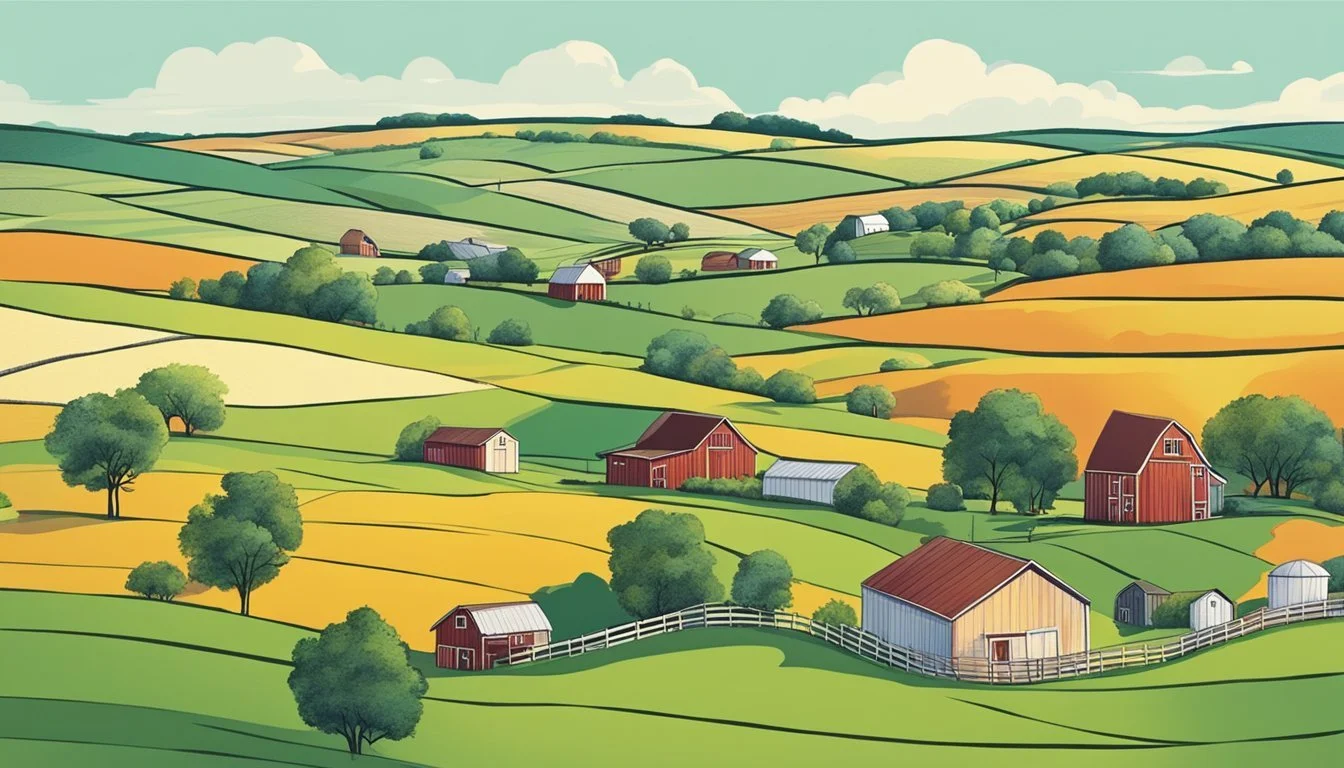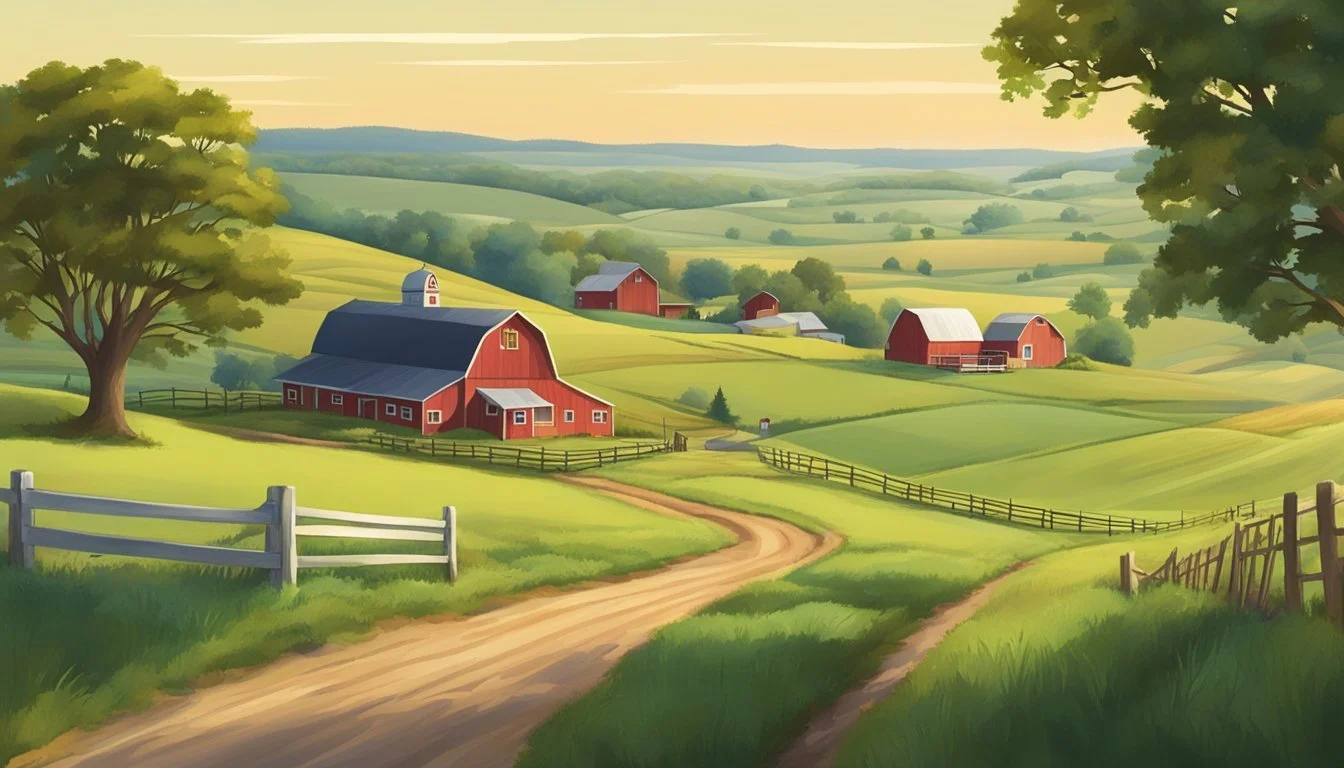Small Farms for Sale in Kansas
Your Guide to the Latest Listings
This Article is Part of State-by-State Guide to Buying Your First Small Farm
The market for small farms in Kansas is diverse, offering a range of properties that cater to the ambitions of both aspiring and seasoned farmers. Kansas is historically known for its agricultural productivity, with vast stretches of fertile soil that provide an ideal foundation for various types of farming operations. From the rolling prairies to the eastern woodlands, small farms scatter the landscape, often featuring homes and outbuildings alongside tillable acreage, pastureland, or specialty crop grounds.
Interested buyers have various options, whether searching for a compact acreage to start a hobby farm or a more expansive tract to scale up their agribusiness. The state's agricultural scene is rich with opportunities for raising livestock, engaging in row crop production, or even cultivating specialty crops. Prices for these small farms reflect the diversity of the land and its potential uses, with listings ranging from under a hundred thousand dollars to over a million, depending on size, location, and available infrastructure.
In addition to the intrinsic value of the land, many of these properties come with existing residential structures and farm-related buildings, offering a turnkey solution for those looking to immediately embark on their farming venture. Locations vary from more remote, rural areas to those closer to local markets and urban centers, allowing for flexibility in lifestyle and marketing opportunities for farm products. With a steady interest in local food systems and sustainable agriculture, Kansas' small farms present a significant opportunity for new and established farmers alike.
Overview of Small Farms in Kansas
Kansas is known for its diverse agricultural offerings, ranging from expansive wheat fields to smaller hobby farms. Its rich farmland presents ample opportunities for purchasing small-acreage properties suited for personal or commercial use.
Significance of Agriculture in Kansas
Agriculture is a cornerstone of the Kansas economy, with the state being a leading producer of wheat, corn, and soybeans. (how long do soybeans last?) Small farms contribute significantly to the state's agricultural output, providing local produce, meat, and dairy products. These farms not only support food supply chains but also contribute to biodiversity and environmental sustainability.
Types of Small Farms
In Kansas, small farms for sale come in various types, each serving different farming interests and lifestyles:
Hobby Farms: Typically ranging from a few to several dozen acres, hobby farms are perfect for those interested in farming on a smaller, more manageable scale, often for personal satisfaction rather than commercial profit.
Rural Mini Farms: These properties offer the chance to cultivate crops or raise livestock on a modest scale, appealing to those who wish to engage in small-scale sustainable agriculture or organic farming.
Country Farmettes: Small-scale farms that often include a residential property coupled with land sufficient for gardening, small orchards, or keeping animals. They are ideal for those looking to partake in the rural lifestyle with the comforts of a home.
The market for small farms in Kansas offers various options, tailoring to the desires of those seeking the farming life, whether it is for leisure, a sustainable living, or a venture into agricultural business.
Buying Process for Small Farms
The transition into small farm ownership requires a clearly defined process, understanding real estate nuances, and having insights into listing and purchase prices.
Steps to Purchasing Farmland
1. Establish a Budget: The first step is to determine the financial resources available for the purchase. Listing prices for small farms in Kansas can vary substantially based on size, location, and existing facilities.
2. Get Pre-Approved for Financing: Prospective buyers should secure pre-approval for a loan, which provides a clear picture of the purchase price range they can afford.
3. Research: Buyers should investigate different regions of Kansas to find the most suitable area for their farming needs. Properties can range in size, with some listings showing farms as small as 17.6 acres in Montgomery County up to larger 40-acre properties.
4. Work with a Real Estate Expert: A real estate agent with experience in rural properties can provide valuable assistance in navigating the market.
5. Conduct Site Visits: Viewing properties in person is essential to evaluate the condition and the potential of the farm.
6. Make an Offer: After finding the right property, the buyer can make an offer in line with the market values and what they can afford.
7. Perform Due Diligence: Buyers should conduct thorough inspections and review all property details before proceeding.
8. Close the Deal: Once everything is approved and both parties agree to the terms, the transaction can be finalized at closing.
Evaluating Property Listings
Review Property Details: Carefully check property features listed, such as acreage, housing structures, and utilities, against personal requirements.
Investigate Local Market Prices: Be informed about going rates in the area for similar properties to assess whether a listing's price reflects the market.
Consider Potential for Growth: A buyer should analyze if the small farm allows for scaling operations in the future.
Assess Financial Viability: It's important to calculate if the farm can generate enough income to cover the mortgage and other associated costs.
Potential buyers should approach the process with a detailed plan and engage in thorough research to ensure the investment aligns with their farming objectives and financial capabilities.
Financial Considerations
When looking at small farms for sale in Kansas, buyers should consider the listing price, price per acre, and overall budget for farm ownership. These financial factors are crucial in making an informed purchase decision.
Understanding Listing Prices
Listing prices for small farms in Kansas can vary greatly, influenced by factors such as location, land size, and available facilities. For instance, a 19-acre property in Montgomery County can be listed for $153,999, which includes a house with 1,144 sq ft and three bedrooms. On the other hand, a 40-acre farm in the same county may have a listing price of $750,000, featuring a larger 2,730 sq ft home with four bedrooms. Buyers should not only look at the aggregate purchase price but also consider the value of included improvements and assets.
Calculating Price per Acre
To calculate the price per acre:
Divide the listing price by the number of acres.
For example, a $165,000 farm spread over 30 acres in Montgomery County would have a price per acre of approximately $5,500.
This metric is particularly helpful when comparing the value of different properties. However, the presence of structures or the farm's yield potential can significantly affect the perceived value, so buyers should use this as one of several comparative tools.
Budgeting for Farm Ownership
Prospective buyers should create a detailed budget that goes beyond the initial purchase price. Ownership costs can include, but are not limited to:
Operating expenses: seeds, fertilizer, equipment
Maintenance costs: repairs, utilities, insurance
Property taxes: vary depending on location and farm size
Buyers should also account for potential revenue from crop sales or leasing land to understand their financial outlook better. Thorough budgeting helps in assessing the long-term affordability and profitability of a farm.
Land and Property Features
When examining small farms for sale in Kansas, potential buyers should prioritize assessing property size and determining land health. These factors are critical in understanding the potential uses and long-term sustainability of the farmland.
Assessing Property Size and Usable Acreage
Property size, often measured in acres, is a fundamental aspect when considering a farm purchase. Small farms in Kansas may range from under 20 acres to over 40 acres, as suggested by recent listings. Prospective buyers should take note of the usable acreage, which refers to the land that can be effectively employed for agricultural activities. Factors such as the presence of buildings or natural features may impact the actual usable space:
Montgomery County: Offers properties such as a 19-acre farm with ample space for cultivation.
Woodson County: Lists a 37-acre tract that could provide extensive room for various farming or livestock endeavors.
Soil Quality and Land Health
The soil quality of a farm determines its suitability for growing crops or supporting livestock, thereby affecting its value and productivity. Properties across Kansas may have diverse soil compositions that affect land health:
Acres: Farms with a higher acreage might offer diverse soil types, increasing the potential for a variety of agricultural applications.
Land for Sale: Current land on offer includes areas with rich, fertile soil, which is crucial for planting crops and ensuring robust yields.
Purchasers should conduct thorough due diligence or consult with a soil specialist to evaluate the fertility and overall health of the farm's land.
Farm Management and Operations
Effective farm management and operations are crucial for the success of small farms in Kansas. They focus on livestock management, crop production, and the implementation of sustainability practices.
Livestock Management
Goats: In Kansas, goat farming requires a robust health management plan, including routine vaccinations and deworming. Housing should provide protection against the elements and predators.
List of requirements for goat management:
Adequate fencing to prevent escapes
Regular health check-ups and hoof care
Access to clean water and a balanced diet
Sheep: Sheep management involves careful breeding programs and wool production monitoring. Proper nutrition and health management are essential to maintain flock productivity.
Table of Health Management Practices:
Practice Frequency Notes Shearing Annually Typically in the spring before lambing Vaccinations As recommended Prevents common diseases in sheep Deworming Semi-annually Essential in controlling internal parasites
Poultry: Poultry farms should prioritize biosecurity measures to protect against disease. Both meat and egg production require consistent monitoring for flock health and egg quality.
Important Considerations for Poultry Management:
Coop cleanliness and ventilation
Protective measures against predators and rodents
Vaccination schedules in line with state regulations
Crop Production
Crop production must be strategically planned, with crop rotation schedules maintained to prevent soil depletion and control pests. The choice of crops should take into account the Kansas climate and soil conditions, typically favoring wheat, soybeans, and corn. Farmers may utilize integrated pest management to reduce the need for chemical pesticides.
Sustainability Practices
Sustainability is vital for long-term productivity and environmental protection on Kansas farms. Water conservation techniques, such as drip irrigation, and organic farming methods reduce the ecological footprint. The use of renewable energy sources, such as solar panels, can also cut operation costs and contribute to a farm’s sustainable profile.
Strategies for Sustainable Farming:
Incorporation of cover crops to improve soil health
Conservation tillage methods to reduce erosion
Strategic grazing practices to maximize pasture longevity





